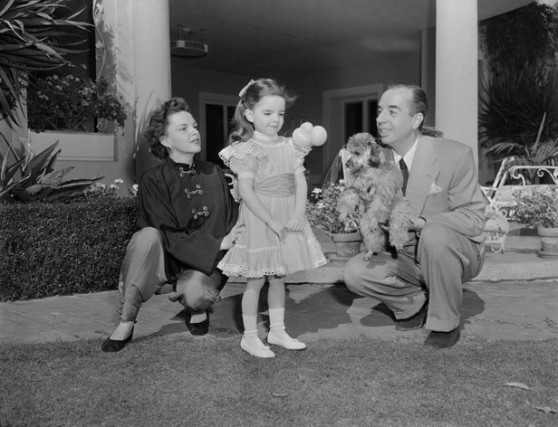Get Happy: Way up high

I knew scarcely anything about Judy Garland before I read Get Happy: The Life of Judy Garland; I don’t know much more about her now.
What I know about the author, Gerald Clarke, is that he’s a completist whose work still makes you think you missed something as you near the book’s end. (He also wrote Capote, considered the definitive biography but rendered irrelevant on every level by George Plimpton’s far superior oral history.) Clarke’s a hard worker, thorough. A lot of information is included, much of it exclusive or new. It’s just ordinary. Clarke appears to lack insight into what made his subjects special, what readers might like to know about them (versus oversubscribed childhood incidents and “then s/he went here, then s/he went there” travelogues).
Clarke is also prone to outbursts of ill-advised overwriting; he uses the word “rutilant” twice, once redundantly (he’d just referred to a “rosy glow”), neither time quite correctly. The word means “glowing red,” and that’s pretty much all it means; you don’t so much use it figuratively. You want to evoke a heartwarming hearthside, use those words. Later, Clarke rushes past references to Garland’s already entrenched amphetamine abuse and her ECT treatments to blame her doldrums on her director’s on-set fascism: “Not that it much mattered: on a Busby Berkeley set, the weather was always turbulent, the menacing sound of thunder never far away” (252). Oy. We’ve all had shitty bosses, but equating the guy with Dr. Frankenstein on an imagery level is simplistic homerism.
Garland’s instability, which either caused or proceeded from her reliance on drugs, or both, is for better or worse a huge part of how she’s remembered; Clarke blames her mother, Ethel (rightly, no doubt), or her directors (probably less culpable), but in the course of dashing past the topic as though it’s a haunted room. Her struggles with her weight, her short neck, these topics pass muster, but…not the uppers. (Rendered on page 313, by the way, as “a kaleidoscope of brilliantly colored pills and capsules.” If anyone needs a dexy, it’s that writing; that shit is tired.)
Garland is an indisputably tragic figure of twentieth-century culture, and her talent is often eclipsed by the tabloidier parts of her life (and her daughters’ lives). I could see Clarke wanting to avert his eyes from those parts, only mentioning them when he can’t not, out of respect for Garland. That’s a goodhearted instinct. But I don’t think that’s why the book doesn’t work — not that he’s not goodhearted, but that, as I said, he seems to have no ear for these people. He’s a great fact-gatherer, but compare this and Capote with Guralnick’s Elvis biography. It’s exhaustive, and its subject presents a similar tug of war between legend and train wreck, but Guralnick isn’t afraid to taffy the timeline in spots, and he’s able to give “back to Vegas for another blah blah Ann-Margret” some rhythm.
It’s serviceable, Get Happy. But it seems to me Garland merits something a bit more emphatic, in either direction. Something great and terrible, you might even say.
Tags: Ann-Margret books Busby Berkeley Elvis Presley George Plimpton Gerald Clarke Get Happy: The Life of Judy Garland Judy Garland Liza Minnelli Lorna Luft Truman Capote Vincente Minnelli





The title of the book succeeded in causing “Get Happy” to run through my head.
@cole, for me it’s a mashup of her version and the Partridges’ “C’mon Get Happy.” Lethal.
I prefer the Ella Fitzgerald version. Sorry Judy!
Hee! I’ve got the Jane Horrocks (in Little Voice) verzh on Inner autoplay now.
I’m hearing Leland Palmer’s version from Twin Peaks.
“… a kaleidoscope of brilliantly colored pills and capsules.”
So his editor was also on pills?
Also, thanks for the earworm(s), guys.
When I think of Judy Garland, I always think of this little 2-minute remembrance thing they air on Turner Classic Movies now and again where Margaret O’Brien (who played her little sister in Meet Me in St. Louis) remembers that Judy would sneak food from her on set, because she wasn’t served anything, because she wasn’t allowed to eat anything. Just diet pills to keep her weight down. That story breaks my heart every time I think of it. No wonder her life turned out how it did.
HERE’s the book you want on Judy Garland http://www.amazon.co.uk/Judy-Garland-Life-Susie-Boyt/dp/1844084124/ref=la_B001HPQ7ZO_1_3?ie=UTF8&qid=1368469633&sr=1-3